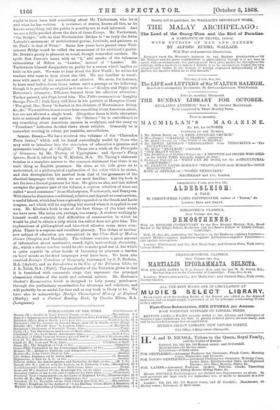SCHOOL BOOKS. — We have received two volumes of the "Clarendon Press
Series," which will be found exceedingly useful by those who may wish to introduce into the curriculum of education a genuine and systematic teaching of "English." These are a work on the Principles of Grammar, by Mr. Thriug, of Uppingham ; and Spenser's Faery Queene, Book 2, edited by G. W. Kitchin, M.A. Mr. Thring's elaborate treatise is a complete answer to the common statement that there is no such thing as English grammar. He aims, as his title gives us to understand, at a philosophical explanation of the rules which ho states, and this distinguishes his method from that of the grammars of the classical languages with which we are most familiar. But his book is not the less a formal grammar for that. He gives us also, and this indeed occupies the greater part of the volume, a copious selection of what are called " mood sentences " from Shakespeare, Wordsworth, and Tennyson. With these he illustrates conditional, relative, and dopendentconstrnctions, a useful labour, which has been copiously expended on the Greek and Latin tongues, and which will be anything but wasted when it is applied to our own. Mr. Kitchin's book is one of the best things of the kind which we have seen. His notes are, perhaps, too scanty. A student working by himself would certainly find difficulties of construction in which he would be glad to obtain a help which the editor does not give him. The explanations of philosophical and historical allusion seem more com- plete. There is a copious and excellent glossary. The claims of another new subject of education are recognized in the Class Book of Modern Science (Simpkin and Marshall). The volume contains a great amount of information about mechanics, sound, light, meteorology, chemistry,
&c., which a clever teacher would be able to make good use of, but which is quite capable in other hands of becoming as grievous a burden on boys' minds as the dead languages ever have been. We have also received Irving's Catechism of Geography, rearranged by J. P. Bedlake, B.A. (Aylott), and an Introduction to the Use of the Tellurion Globe, by J. L. Naish, B.A. (Wyld). The peculiarity of the Tollurion globe is that it is furnished with concentric rings that represent the principal elementary circles of the earth and celestial sphere. Mr. Benham's Student's Examination Guide is designed to help young gentlemen through tho preliminary examination for attorneys and solicitors, and will probably be as useful for that end as any book is likely to be. We have also to acknowledge illurby's Chronological History of England
(M arby), and a Poetical Beading Book, by Charles Bilton, B.A. (Longmans).






























 Previous page
Previous page